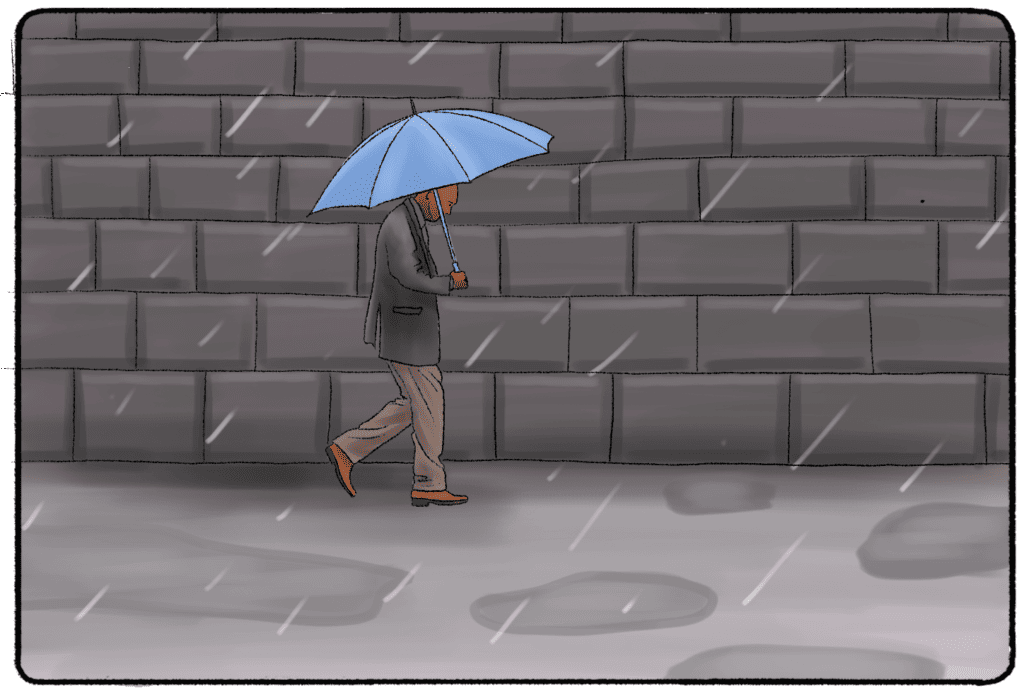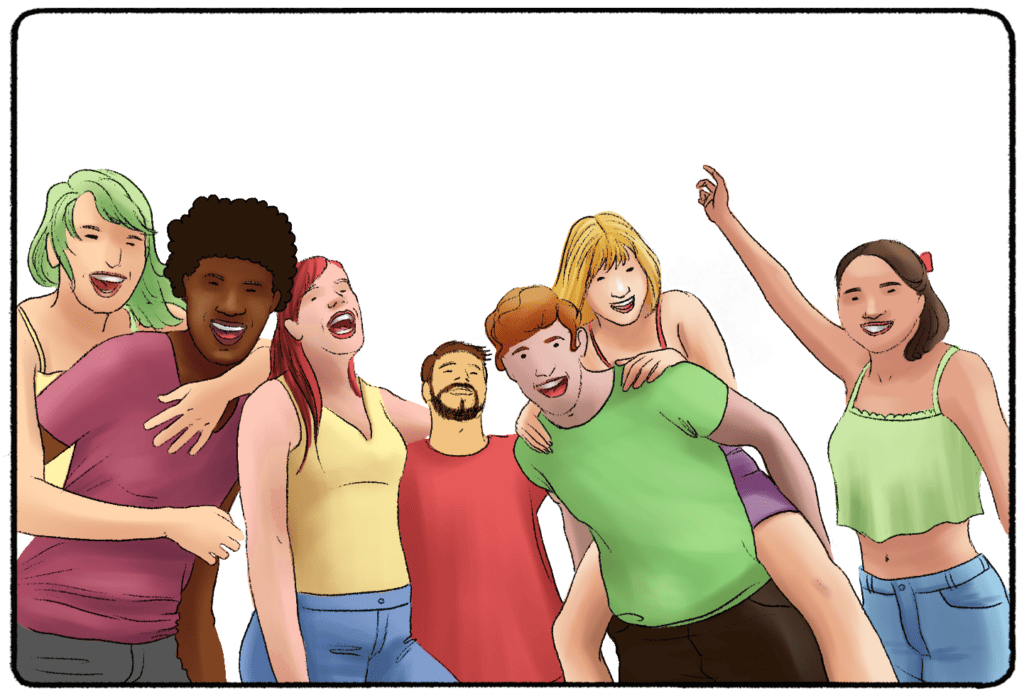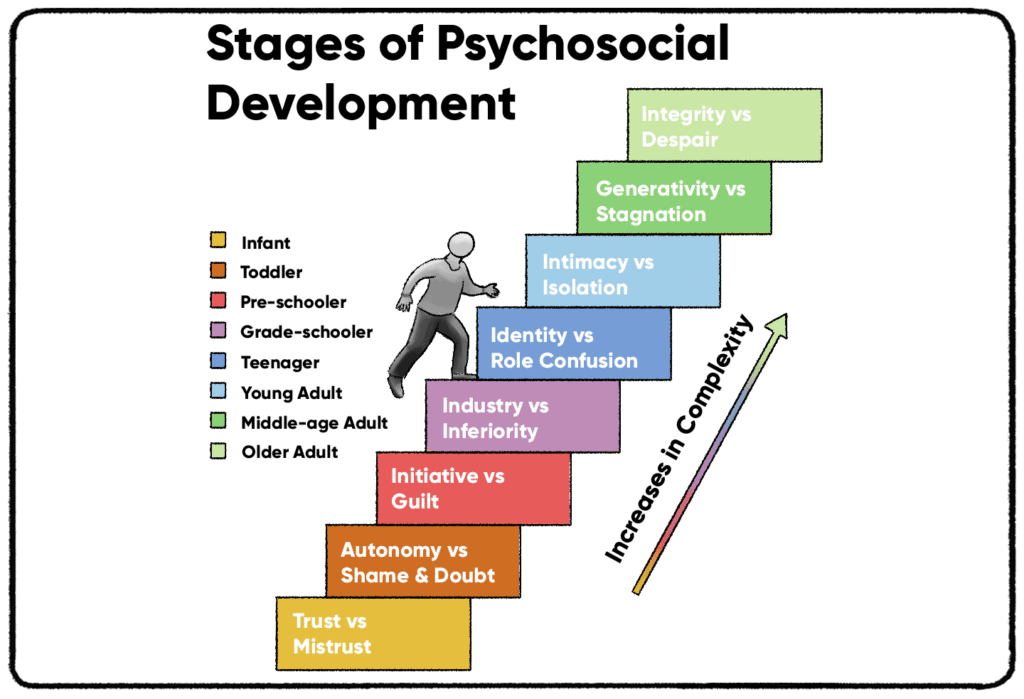There is an epidemic that has been affecting people around the world. It’s an epidemic that just won’t seem to go away. It’s the loneliness epidemic. It sounds dramatic to call loneliness an “epidemic,” but research on loneliness and health is pretty shocking. Some experts equate loneliness to smoking 15 cigarettes a day. People experience loneliness and social isolation at all stages of life, but one age is key, according to Erikson's stages of psychosocial development: the intimacy vs isolation stage.

What Is Intimacy vs. Isolation?
The sixth stage of Erikson’s Stages of Psychosocial Development is the Intimacy vs. Isolation stage. This stage occurs throughout adulthood and contains a crisis where people search for intimacy. Without intimacy, a person may be unable to "move on" to later stages.
What Age Does Intimacy Vs. Isolation Occur?
This stage, also known as "love vs. isolation," occurs once an adolescent has reached adulthood. It lasts around 20 years, one of the longest stages so far! If the person has successfully completed all five stages of development, they have a solid foundation and sense of who they are. Once they have this solid identity, they can begin to explore their relationships with other people truly.
What Is The Positive Outcome of the Intimacy vs. Isolation Stage?
One of the most important events during the intimacy vs. isolation stage is forming serious, romantic relationships. People in this stage will likely meet partners who will be in their lives for years, decades, or until they die. Intimacy, in this stage, obviously doesn’t just mean physical intimacy. Romantic partners fulfill different roles: lover, yes, companion, co-parent, roommate, etc. Exploring these relationships and the roles people fill in your lives can help you avoid people who are not right for you and become more intimate with the ones who are.
Of course, romantic relationships are not the only ones that form during this stage. People in their 20s also start closing their circles and taking their friendships more seriously. Teenagers and college freshmen may not be so close with their parents as they explore their newfound freedoms. Young adults, however, may start to become closer to their parents.
The virtue that is gained during this stage is simple: love. Of course, people experience love before they are in their 20s, but exploring relationships during this stage deepens your love for the people in your circle. Most people start to take love seriously between the ages of 20 and 40, often for the first time.
Isolation
Unfortunately, not every person hits 40 and is married to the love of their life with a solid group of friends and family around to fulfill them. If people cannot establish intimate romantic or platonic relationships with others, they will likely become isolated.
As I mentioned earlier, isolation can be seriously dangerous for mental and physical health. Humans are social creatures and often seek support from friends and people in their circle. Safety, security, and belonging are basic needs - being part of a friend group or family provides that. As you’ll learn later, isolation can also prevent people from successfully completing the last two stages of Psychosocial Development.
Examples of Intimacy vs Isolation in Books
If you want to learn more about the crisis, look no further than famous novels and stories! This Reddit post contains some suggestions for books that explore this crisis, including the works of Dostoevsky, Goethe, and Gabriel García Márquez.
Other Psychological Theories Regarding Relationships
Erikson is not the only psychologist to explore the crisis that comes from forming (or not forming) intimate relationships. Theories like the triangular theory of love explore what makes a relationship intimate, all-consuming, or insignificant. Remember, all of these concepts are just theories. If you find that what one psychologist says doesn't apply to your relationships, that's okay!
Tips for Avoiding Isolation
During the ages of 20-30, you might find yourself experiencing a “quarter-life crisis.” Many young adults are still figuring out who they want to be and what they want to do with their lives. Intimate relationships can help support you as you explore your identity. If you are isolated, take some time to assess why and how you can grow closer to the people in your life. This advice may help you break out of patterns that cause loneliness and form intimate, happy relationships with others.
Friendships: Be Open and Honest About Your Needs
You don’t have to be in a relationship to have intimate connections with people. (There are other forms of intimacy besides physical!) Friendships can be great sources of respect, support, and love. For some people, friends are family. But friendships, like all relationships, are a two-way street.
Have a conversation. Do your friends know that you are feeling lonely? What can they do to support you? Talk to the people in your circle now about relationships and expectations. Open, honest conversations are the first step to a closer relationship.
Give your friends a chance to support you. Often, we suppress our feelings or problems because we don’t want to take up too much time or give our friends the task of supporting us. But real friends want to offer their support. There is a way to ask for support without “dumping” on your friends. Be patient and kind as you ask for space to vent your feelings or solve a problem. Your friends will appreciate your vulnerability, and you may become closer together as you work things out!
Don’t be afraid to let people go. Not everyone sees friendships as an opportunity for intimacy or closeness. Some people just want to go out and party. Others prioritize friendships until they enter a romantic relationship. If someone isn’t providing you with the things you need in a friendship, consider prioritizing your time on people who will better appreciate you.

Romantic Partners: Tear Down Your Walls
We all dream about finding the love of our lives, but forming an intimate, romantic relationship with someone doesn’t always feel like a fairytale. Swiping through dating apps can be tiring. Going on first dates, only to discover that you don’t like the person you’re dating, can be disappointing. And once you do form a relationship with someone, you still have a long way to go before you may feel comfortable being intimate with them (and not just physically!) Again, to make these relationships last, we must return to our identity, autonomy, and other skills developed in Erikson’s earlier stages.
What do you want in a partner? Do you want someone who will prioritize relationships, including friendships or family relationships? Do you want someone who wants to provide for their partner financially or emotionally? Take some time to write down what you want in a partner. Make a list of 10 things, and think beyond looks or interests. What type of team do you want to form with a partner? With this in mind, you can more easily narrow your dates until you find someone who meets most of your criteria.
(And remember that prioritizing one area of life means sacrificing another! A person may prioritize work over relationships, and you’ll spend many nights at home without them while they’re at work. That’s okay if you also prioritize work or want a partner who can provide for you. Know that you can’t have everything - no human is perfect or limitless.)
Keep an open mind. Every date is an opportunity for you to meet someone new. Think of that the next time you have a “bad date.” Did you learn something new? Do you have a funny story? Maybe you didn’t feel the romantic spark with this person, but you can walk away knowing you’ve made a new friend. This line of thinking puts the power back in your hands to pursue dating with optimism and excitement.
Open your heart. Everyone is looking for their person. Everyone has to make sacrifices, be open, and make changes to find their person. Once you’ve entered a relationship, be open about what you can provide a person and how much you are willing to share with them. This conversation will set boundaries and give both parties an idea about if you are truly aligned in what you want.
Forming or Assessing Relationships with New People
Other relationships can also fulfill your need for intimacy. Your best friend may be living in your town, but you haven’t met them yet! Need to widen your circle? Join meetups or groups for people who share your interests. Don’t be afraid to reach out or set up a meetup of your own!
Assess your needs. Attend meetups based on what you’re looking for in relationships. Maybe you just want people who enjoy the same interests as you. Great! Find groups where people are doing all the things you like to do. With the Internet, we have unlimited access to people interested in everything.
Maybe you are looking for support as you enter a new chapter of your life. You are becoming sober, or you are experiencing grief. Support groups are available to help you through this time. Not all of these groups involve people sitting around a basement sharing their problems, either. There are plenty of recovery groups that go on fun adventures! Once you start looking for groups of people who offer support, you may be surprised at what you find.
Reach out to a professional. If you are experiencing doubts about your ability to form relationships or set proper boundaries, contact a relationship therapist. Issues from earlier stages may leave you with mistrust, guilt, or feelings of inferiority. This can seriously impact your ability to be vulnerable with others and become part of a group. A relationship therapist can help you unravel these past experiences and move forward.
Intimacy Doesn’t End at Age 40.
There are two more stages in Erikson’s Stages of Psychosocial Development, but that does not mean people over 40 have to turn the page on intimacy and love. In fact, the next two stages can help strengthen the bonds between people who meet in their 40s, 50s, and beyond. People build and strengthen beautiful relationships at all ages.

As individuals age and navigate the complexities of life, they encounter the latter stages of Erikson's Psychosocial Development. These stages center around profound reflections on one's life journey, contributions to society, and the ultimate acceptance of one's life.
Generativity vs. Stagnation (Middle Adulthood, approx. ages 40-65)
- Overview: This stage is marked by productivity and the need to contribute positively to society, typically through raising a family and working.
- Positive Outcome (Generativity): Those who find purpose and contribute meaningfully during this stage, whether through their career, raising children, or community involvement, feel a sense of accomplishment and satisfaction.
- Negative Outcome (Stagnation): In contrast, those who don't find their actions meaningful may feel stagnant, unproductive, or uninvolved, leading to feelings of worthlessness or inactivity.
Integrity vs. Despair (Late Adulthood, approx. ages 65 and up)
- Overview: In this final stage, individuals reflect on their lives, contemplating their choices, accomplishments, and potential regrets.
- Positive Outcome (Integrity): Those who look back on their life with few regrets and feel accomplished will achieve a feeling of integrity and wisdom. They find solace and pride in the life they've led.
- Negative Outcome (Despair): Conversely, those who harbor regrets or feel they did not lead a meaningful life might experience feelings of bitterness and despair, feeling that life has been wasted.
By understanding these stages, people can better navigate their feelings and relationships during these pivotal moments in life. These reflections and resolutions, especially in the later stages, significantly influence how individuals form new relationships, approach dating, and even perceive their place within their community and the larger society. Knowing where one stands in these stages can provide clarity and a roadmap for potential growth and introspection.
